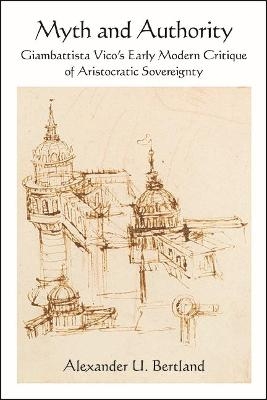
Myth and Authority
Giambattista Vico's Early Modern Critique of Aristocratic Sovereignty
Seiten
2022
State University of New York Press (Verlag)
978-1-4384-9019-9 (ISBN)
State University of New York Press (Verlag)
978-1-4384-9019-9 (ISBN)
Argues that Giambattista Vico's early modern account of Roman mythology was a sophisticated attempt to present an epistemological and political critique of the aristocratic way of conceiving the world.
Living in a province dominated by powerful oligarchs, Giambattista Vico (1668–1744) concluded that political philosophy should work to undermine aristocratic authority and prevent political devolution into feudalism. Rejecting the possibility that the free market could successfully instill civil behavior, he advocated for a strong central judicial system to work closely with citizens to promote stability and justice. This study puts Vico in conversation with other Enlightenment thinkers such as Locke, Rousseau, and Mandeville to show how his alternative warrants serious consideration. In contrast to scholars who read Vico's New Science as a defense of the imagination, this study casts his account of poetic wisdom politically as an epistemological critique of the aristocratic mentality. Myth and Authority argues that Vico's depiction of pagan religion is a refined attempt to explain how oligarchy maintains its stranglehold on power. While Western civilization did not follow the path Vico suggested, it may now be more relevant as concerns grow about the increasing influence of the wealthy on civil institutions.
Living in a province dominated by powerful oligarchs, Giambattista Vico (1668–1744) concluded that political philosophy should work to undermine aristocratic authority and prevent political devolution into feudalism. Rejecting the possibility that the free market could successfully instill civil behavior, he advocated for a strong central judicial system to work closely with citizens to promote stability and justice. This study puts Vico in conversation with other Enlightenment thinkers such as Locke, Rousseau, and Mandeville to show how his alternative warrants serious consideration. In contrast to scholars who read Vico's New Science as a defense of the imagination, this study casts his account of poetic wisdom politically as an epistemological critique of the aristocratic mentality. Myth and Authority argues that Vico's depiction of pagan religion is a refined attempt to explain how oligarchy maintains its stranglehold on power. While Western civilization did not follow the path Vico suggested, it may now be more relevant as concerns grow about the increasing influence of the wealthy on civil institutions.
Alexander U. Bertland is Associate Professor of Philosophy at Niagara University.
Acknowledgments
Abbreviations and Use of Sources
1. Approaching the New Science
2. Giambattista Vico: Early Modern Philosopher
3. Imaginative Universals
4. Feudalism
5. Secret Laws
6. The Roman Pantheon
7. Poetic Wisdom and Class Conflict
8. Is Vico Right?
Notes
Bibliography
Index
| Erscheinungsdatum | 03.10.2022 |
|---|---|
| Reihe/Serie | SUNY series in Contemporary Italian Philosophy |
| Zusatzinfo | Total Illustrations: 0 |
| Verlagsort | Albany, NY |
| Sprache | englisch |
| Maße | 152 x 229 mm |
| Gewicht | 227 g |
| Themenwelt | Geisteswissenschaften ► Philosophie ► Erkenntnistheorie / Wissenschaftstheorie |
| Geisteswissenschaften ► Religion / Theologie | |
| ISBN-10 | 1-4384-9019-4 / 1438490194 |
| ISBN-13 | 978-1-4384-9019-9 / 9781438490199 |
| Zustand | Neuware |
| Haben Sie eine Frage zum Produkt? |
Mehr entdecken
aus dem Bereich
aus dem Bereich
die Grundlegung der modernen Philosophie
Buch | Softcover (2023)
C.H.Beck (Verlag)
CHF 25,20
Buch | Softcover (2023)
Reclam, Philipp (Verlag)
CHF 9,80


![Was heißt Denken?. Vorlesung Wintersemester 1951/52. [Was bedeutet das alles?] - Martin Heidegger](/media/113619842)